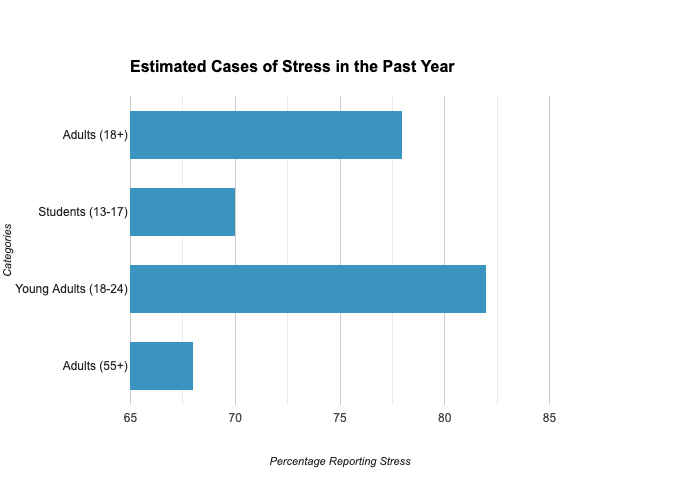Coping with Stress in Daily Life: Strategies for a Healthier Mindset
Stress is an inevitable part of life, and while some stress can be motivating, excessive or chronic stress can have a negative impact on both our physical and mental health. From work pressures to personal responsibilities, the sources of stress can vary widely. However, learning to cope with stress in healthy ways is essential for maintaining overall well-being. In this article, we will explore effective strategies for coping with stress in daily life, helping you cultivate a healthier mindset and improve your quality of life.
Understanding Stress
Understanding stress is crucial for effectively managing it and maintaining overall well-being. Stress is a natural response that occurs when you perceive a situation as threatening or challenging. This perception triggers a cascade of physiological responses in your body, including the release of stress hormones like cortisol and adrenaline, which prepare you for a “fight or flight” response.
While acute stress can be beneficial in certain situations, chronic or excessive stress can have a negative impact on both your mental and physical health. Chronic stress occurs when you are continuously exposed to stressors, such as work pressures, relationship issues, financial problems, or health concerns, without adequate relief or coping mechanisms.
Chronic stress can manifest in a variety of ways, including:
- Physical Symptoms: Chronic stress can lead to headaches, muscle tension, fatigue, and sleep disturbances. It can also weaken the immune system, making you more susceptible to illnesses.
- Emotional Symptoms: Prolonged stress can contribute to feelings of anxiety, depression, irritability, and mood swings. It can also affect your ability to concentrate and make decisions.
- Behavioral Changes: Chronic stress can lead to changes in behavior, such as overeating or under-eating, increased use of alcohol or drugs, social withdrawal, or engaging in risky behaviors.
Understanding your individual stressors and how they impact you is the first step in effectively managing stress. Keeping a stress journal can help you identify patterns and triggers, allowing you to develop strategies for coping with stress more effectively.
It’s important to remember that stress is a normal part of life, and it’s okay to seek help if you’re feeling overwhelmed. Learning healthy coping mechanisms, such as mindfulness, exercise, healthy eating, and relaxation techniques, can help you better manage stress and improve your overall well-being.

Identifying Sources of Stress
The first step in managing stress is to identify the sources of stress in your life. These can be external factors, such as work deadlines, financial pressures, or relationship issues, or internal factors, such as perfectionism or negative self-talk. Keeping a stress journal can help you track your stressors and identify patterns, making it easier to address them effectively.
Healthy Coping Strategies
- Mindfulness and Meditation: Mindfulness involves being fully present and aware of your thoughts, feelings, and sensations in the present moment without judgment. Meditation practices, such as guided meditation or mindfulness meditation, can help cultivate mindfulness and reduce stress levels.
- Physical Activity: Engaging in regular physical activity is a powerful way to reduce stress and improve mood. Exercise helps release endorphins, which are chemicals in the brain that act as natural painkillers and mood elevators. Whether it’s walking, jogging, dancing, or yoga, find an activity that you enjoy and make it a regular part of your routine.
- Healthy Eating: A well-balanced diet rich in fruits, vegetables, whole grains, and lean proteins can help support your body’s ability to cope with stress. Avoiding excessive caffeine, sugar, and processed foods can also help stabilize your mood and energy levels.
- Adequate Sleep: Getting enough sleep is crucial for managing stress and maintaining overall health. Aim for 7-9 hours of quality sleep each night to allow your body and mind to rest and rejuvenate.
- Social Support: Building strong social connections can help buffer the effects of stress and provide a sense of belonging and support. Spend time with friends and family members, join a support group, or participate in social activities that bring you joy.
- Time Management: Effective time management can help reduce feelings of being overwhelmed and improve your ability to cope with stress. Prioritize your tasks, set realistic goals, and break larger tasks into smaller, more manageable steps.
- Relaxation Techniques: Practicing relaxation techniques, such as deep breathing, progressive muscle relaxation, or guided imagery, can help reduce stress and promote a sense of calmness and relaxation.
- Hobbies and Leisure Activities: Engaging in hobbies or leisure activities that you enjoy can help distract you from stressors and provide a sense of fulfillment and joy.
- Setting Boundaries: Learning to say no to requests that are beyond your capacity or that cause you undue stress is important for maintaining your mental and emotional well-being. Setting boundaries allows you to prioritize your own needs and avoid burnout.
- Seeking Professional Help: If you’re feeling overwhelmed by stress and finding it difficult to cope, consider seeking help from a mental health professional. They can provide you with tools and strategies to better manage stress and improve your overall well-being.
How Therapy Can Help Your Stress Level
Stress is a normal part of life, but it doesn’t have to control your life. By implementing these coping strategies into your daily routine, you can reduce stress levels, improve your mental and physical health, and cultivate a healthier mindset. Remember, it’s okay to ask for help when you need it, and taking care of yourself is essential for living a balanced and fulfilling life.